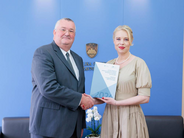On 10 July 2025, Deputy Human Rights Ombudsman Ivan Šelih—who has been leading the Human Rights Ombudsman institution since the conclusion of Ombudsman Peter Svetina’s term on 24 February 2025—and Deputy Ombudsman Dr. Dijana Možina Zupanc presented the 2024 Annual Report of the Human Rights Ombudsman to the President of the National Assembly of the Republic of Slovenia, Urška Klakočar Zupančič, MSc. On this occasion, they also presented her with the Annual Report of the National Preventive Mechanism (NPM).
In his press release, Deputy Šelih emphasised that the number of processed complaints in comparison to last year slightly increased – the total number was 6,288. “Calls to the more efficient operation of state bodies, greater respect of rights of vulnerable groups, and elimination of long-lasting systemic deficiencies remain at the forefront of the report,” he emphasised.
In his words, the report clearly shows that changes for the better – especially in the field of human rights – frequently happen too slowly and are hindered by the lack of political and expert dialogue. “Naturally, the will to talk is not enough for the realisation of the Ombudsman’s recommendations; the political will for urgent systemic change and respect for human rights in concrete situations is crucial,” he warned.
He also touched upon the significance of the legitimate management of independent state institutions. He stated the concern that the institution has been operating without its head with a full mandate for more than four months which he deemed as alarming. “Such a state lessens the institution’s authority, its strategic direction, and its ability to respond to complex social challenges; above all, it weakens its convincingness when warning about violations of human rights,” he explained.
Šelih added that in its incomplete assembly the Ombudsman is forced to act primarily reactively, which lessens its influence and creates a serious gap in the system of encouraging and protecting human rights. The long-lasting institutional uncertainty weakens the legitimacy of the institution and, in long term, certainly undermines the trust of the public that is crucial for the operation of independent institutions.
Šelih especially warned about the fact that all this is happening in a time when the Ombudsman is preparing for the reaccreditation with the Global Alliance of National Human Rights Institutions (GANHRI). “Status A according to the Paris Principles that the Ombudsman acquired in 2022, after more than 20 years of continues efforts, is the highest international confirmation of independence and efficiency. The long-lasting situation of being without the appointed leader can jeopardise the conditions for the preservation of this status and consequently Slovenia’s reputation,” he emphasised.
Kindly click here to read the full article.
Source: The Office of the Human Rights Ombudsman of the Republic of Slovenia

